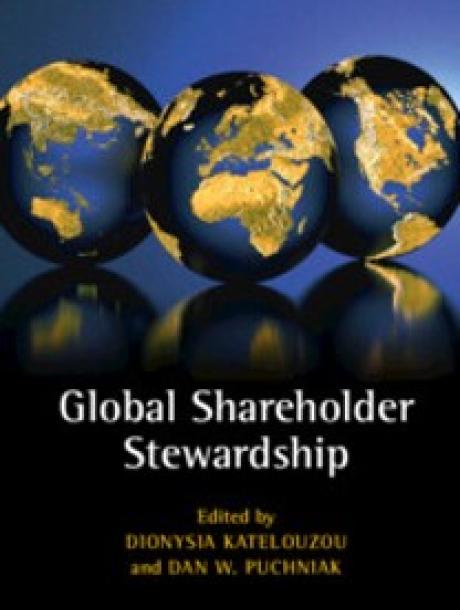
Global Shareholder Stewardship
This is the first in-depth comparative and empirical analysis of shareholder stewardship, revealing the previously unknown complexities of this global movement. It highlights the role of institutional investors and other shareholders, examining how they use their formal and informal power to influence companies. The book includes an in-depth chapter on every jurisdiction which has adopted a stewardship code and an analysis of stewardship in the world's two largest economies which have yet to adopt a code. Several comparative chapters draw on the rich body of jurisdiction-specific analyses, to analyze stewardship comparatively from multiple interdisciplinary perspectives. Ultimately, this book provides a cutting-edge and comprehensive understanding of shareholder stewardship which challenges existing theories and informs many of the most important debates in comparative corporate law and governance.
Contributors
Dionysia Katelouzou, Dan W. Puchniak, Paul Davies, Eva Micheler, Christoph Van der Elst, Anne Lafarre, Daniel Daeniker, Gérard Hertig, Giovanni Strampelli, Hanne S. Birkmose, Marina B. Madsen, Jukka Mähönen, Beate Sjåfjell, Monica Mee, Wolf-Georg Ringe, Gen Goto, Sang Yop Kang, Kyung-Hoon Chun, Andrew Jen-Guang Lin, David C. Donald, Samantha S. Tang, Petrina Tan Tjin Yi, Patanaporn Kowpatanakit, Piyabutr Bunaramrueang, Umakanth Varottil, Lin Lin,Tim Bowley, Jennifer G. Hill, Cynthia A. Williams, Jill Fisch, Austin Ouko, Natania Locke, Bruno Bastos Becker, Rafael Andrade, Viviane Muller Prado, Roger M. Barker, Iris H-Y Chiu, Alice Klettner, Konstantinos Sergakis, Ernest Lim, Alan K. Koh, Mathias Siems
Reviews
Institutional investors face growing pressure to assume 'stewardship' responsibilities through engagement with portfolio companies; 'stewardship codes' have proliferated. This superbly imagined and edited volume demonstrates that the contours of 'stewardship' vary widely throughout the world, depending on the persistence of controlling owners and different government efforts to deploy 'stewardship' in pursuit of various economic and political objectives. The book is essential reading for those seeking to understand the evolving pattern of global corporate governance.
This book is a goldmine of information on, and insights into, one of the most important phenomena of contemporary corporate governance: shareholder stewardship. It combines an impressive number of chapters reporting about stewardship and the related soft (and, increasingly, hard) law in individual jurisdictions with a variety of sharp and profound theoretical and comparative analyses of responsible ownership and its implications for listed companies, investors and other stakeholders.
An amazing book fully canvassing global shareholder stewardship. The forty-two authors go well beyond the twenty excellent country reports. They analyse the foundations – the UK Stewardship Code being the international model – and present thorough comparative essays covering topics such as corporate governance, sustainable finance, shareholder stewardship enforcement and ESG, as well as convergence and strong remaining path dependencies. A wealth of economic and legal information, to be bought and read!
The first comprehensive and sophisticated attempt to examine the proliferation of stewardship codes in recent years, this book elucidates principal issues concerning shareholder stewardship, and at the same time reveals the subtle interaction between local corporate governance factors and the codes of individual jurisdictions. Those who aspire to achieve a mature understanding of this significant global phenomenon will find this admirable outcome of a large-scale international joint endeavour an indispensable source of reference.
What if shareholders around the world are called to save companies, economies and the planet? In Global Shareholder Stewardship, an outstanding group of experts from a wide array of jurisdictions join forces to examine the spread of stewardship codes worldwide as the latest corporate governance trend. Refusing to take global diffusion at face value, the book digs into local manifestations of the phenomenon, unveiling remarkable diversity. A tour de force of comparative scholarship, it offers invaluable lessons for scholars and practitioners in corporate governance and transnational policymaking about the challenges and promises of adapting international developments to different national contexts.
Global Shareholder Stewardship is a must-read for institutional investors with international portfolios. Its systematic analysis of stewardship code regulation in major capital markets will be of great value for practitioners. It also tackles critical questions such as the role of index funds and stewardship enforcement, and suggests ways to optimize the impact of stewardship. This is one of the books that will have a place on my desk.
Dionysia Katelouzou and Dan Puchniak have orchestrated a masterful study, covering a sample of countries from every inhabited continent, to which they add insightful conceptual analyses. Against a backdrop of genuine urgency in addressing global-scale social challenges, from environmental degradation to climate change, coupled with the emergence of mammoth-size institutional investors, this volume provides an invaluable resource for assessing whether these investors could play a role in addressing such challenges.
lobal Shareholder Stewardship is an excellent compendium of codes around the world today. The 2003 ICGN Statement on Institutional Shareholder Responsibilities clarified the important role of investors in holding companies to account for preserving and enhancing long-term sustainable value, ultimately contributing to strong economic growth, prosperous societies and a healthy environment. Nearly two decades later, this book confirms that stewardship is now mainstream and vital in global capital markets to mitigate risk, while also creating long-term sustainable value.
This book does a remarkable job providing the first in-depth analysis of global shareholder stewardship. The skill, diversity, and creativity of its contributors – combined with its thoughtful curation and insightful comparative theories – is why this book is destined to be the leading authority in the field. It is a must read for anyone interested in the regulation of financial markets, institutional investors, or corporate governance.




















